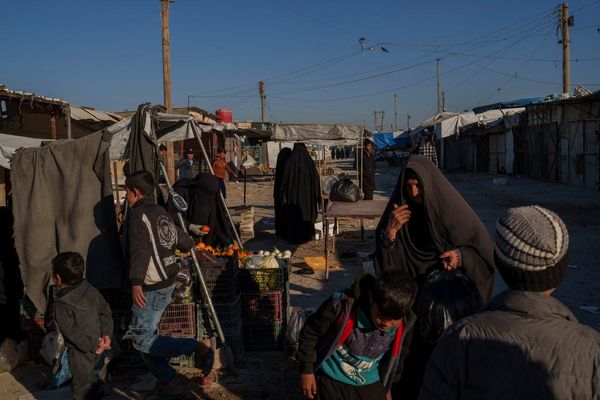
Golda Meir, Israel's only female prime minister, once commented on her fairly advanced years upon securing the country's top job, saying "Being 70 is no sin, but it's not a joke either."
But Meir, who was confirmed by the Knesset as prime minister 50 years ago on Sunday, was also renowned for her more xenophobic remarks, particularly at the expense of Palestinians.
"There were no such thing as Palestinians," she was quoted as saying in the Sunday Times and Washington Post in June 1969.
"When was there an independent Palestinian people with a Palestinian state? … It was not as though there was a Palestinian people in Palestine considering itself as a Palestinian people and we came and threw them out and took their country away from them. They did not exist," Meir said.
For her critics, Meir's jingoistic comments concerning Palestinians remain one of her defining - and most damning - legacies.
Meir, said Elinor Burkett, author of Golda Meir: The Iron Lady of the Middle East (2008), "was not a subtle thinker."
Indeed she was, according to many observers, incapable of contemplating that the creation of Israel had given Palestinians, who lost their homes in the wake of its rise, a different narrative of events.
"[Meir] was intent on ethnically cleansing the indigenous population from Palestine to make room for Jewish immigrants," the American Muslims for Palestine, a US-based group dedicated to educating the American public about Palestine and its heritage, said. "She had no problem with forcibly removing people from their homes and kicking them out of their country in order that Israel may exist."
Jonathan Ofir, an Israeli musician, conductor and blogger based in Denmark, wrote of Meir's observations about Palestinians: "If one wanted to be apologetic, one could attempt to see Meir's comments as a mere reference to national definition, as I have heard even liberal Israelis seek to do.
"But, as mentioned, the view of the nationality and local connection as 'non-existent' played a part in the Israeli-Zionist ideology of dispossession."
Meir grabbed the reins of the prime minister's post and held on tight for five years.
Her tenure saw her make headlines for her terse and aggressive comments, but also for those events that happened on her watch - not least the 1972 Munich massacre in which 11 members of the Israeli Olympic team were killed and the 1973 October War.
But, according to Burkett, this Jewish immigrant to the United States and Israeli stateswoman was certainly no feminist.
"American feminists loved to adopt Golda, but she was not interested," Burkett told Al Jazeera. "It wasn't that she was hostile to women's achievements, it was that she ignored gender prejudices. And she was like a bulldozer … She didn't think of her [premiership] as an achievement for women. She thought of it as an achievement for Golda."
Born into poverty in what is today Ukraine, in 1898, she emigrated to the US as a child with her family and settled in Milwaukee, Wisconsin, where she completed her education and eventually became a teacher.
In 1921, after marrying, she and her husband immigrated to Palestine, then under British mandate. From then on, her political trajectory took flight and by 1948, when the state of Israel was established after the British mandate expired, she had already cemented her place in Israeli history.
Prior to her assuming the most powerful job, Meir, a socialist Zionist, cut her teeth as a cabinet minister, not least as minister for labour and then as foreign minister.
In the former role, and as Jewish immigrants flocked to settle in the new nation-state as Palestinians were forced from their homes, she oversaw the construction of housing and a new welfare system.
"As foreign minister, [her activities] with Africa kept Israel popular at the UN, much, much longer than would have been expected," Burkett, the biographer said, referring to Meir's foreign policy overtures in supplying aid and technical know-how to emerging African states.
But it was her alliance with the US that many of her advocates see as her ultimate achievement as the state's top diplomat.
"People forget that the alliance between the United States and Israel, coming from the top of the US government, was not so clear before Golda was foreign minister," continued Burkett. "But Golda made that happen."
By the time this mother of two took over as prime minister in March 1969, Meir's fire was fading - and she was at an age where many, even today, would consider calling it a day.
Her perceived successes as a politician - and her role in 1948 in raising millions of dollars in funds from the US to aid Israel's evolution - had given her national clout like few others as the rise of Israel saw the rights of Palestinians become ever-more superfluous.
However, Meir, who was secretly undergoing cancer treatment at the time and who often played up to her craggy appearance as a good-natured Jewish grandmother, now faced a very different kind of role in the hot seat, which opened up following the death of then-Israeli Prime Minister Levi Eshkol.
In this time of turmoil, Meir, tempted back having previously retired from politics, found favour with her Labour Party as a "consensus candidate".
"Her motive as prime minister was 'don't rock the boat'," said professor Meron Medzini, author of Golda - A Political Biography, to Al Jazeera of Meir's "temporary" job that lasted half a decade.
"No revolutions, no changes, no experiments - both at home and overseas. This had partly to do with her age and partly to do with the fact that she had lost her revolutionary zeal … Her achievements were before she became prime minister."
That said, Meir was, as political leaders the world over, at the mercy of events.
Arguably, the most contentious of all was the 1973 October War, which saw Egyptian and Syrian forces launch a surprise attack against Israel on Yom Kippur, the holiest day in the Jewish calendar. Israel soon turned the tide - but at great military cost.
Meir, whose government was lambasted for its lack of preparedness and who remains the subject of fierce criticism from some in Israel for allegedly ignoring previous peace overtures from then Egyptian President Anwar Sadat, stepped down amid the political fallout in April the following year.
Shunned by Palestinians who recall her indifference to their rights, Meir, who died in Jerusalem in 1978 at the age of 80, is not beloved by all Israelis, despite many in her country recalling her with fondness.
Ofir, himself born in the early 1970s, told Al Jazeera that, while he felt pride for Meir in his younger days, his views of Israel's uncompromising stateswoman had changed rapidly over the years.
"In the end, her attitude towards Palestinians was basically a macho, chauvinist, denialist attitude, which is intrinsically inherent in Zionism," he added.
Follow Alasdair Soussi on Twitter: @AlasdairSoussi







